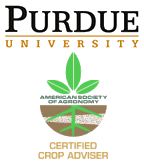
Proceedings 2008
Indiana Certified Crop Adviser Conference
Dealing with Sulfur Deficiencies in Crop Production: the Northeast Iowa Experience
Over forty years of historical research in Iowa (nearly 200 site-years of data) had rarely noted improved crop yield with sulfur (S) fertilization. In 2005 and 2006, S deficiency was document through large forage yield and plant S increase from applied S fertilizers in northeast Iowa alfalfa fields, in particular field areas with low organic matter, eroded, and side-slope soil landscape positions. Exploratory research with corn in 2006 indicated significant yield increase to S application in specific field areas where early-season corn plant coloration indicated possible S deficiency, including coarse-textured soils and field areas similar to those found S deficient in alfalfa fields. Also, S fertilizer product evaluation in 2006 at two sites resulted in corn yield increase when S deficiency symptoms were not present. In 2007, S rate trials were initiated at twenty producer field sites to further document extent of S deficiencies and needed S application. Corn yield increase to S application was significant at seventeen of twenty sites, with an average yield increase of 18 bu/acre when an adequate rate of S was applied. On coarse textured soils (loamy sand and sandy loam), the optimal S rate was 24 lb S/acre and on finer textured soils (loam and silt loam) was 14 lb S/acre. Leaf S concentrations were low at all sites when S was not applied. These results indicate that S deficiency in corn is more widespread in northeast Iowa than previously suspected and research continues to delineate the probability and geographic extent of S deficiency in Iowa corn and other cropping systems. In addition, tools are being evaluated for detecting S deficiencies and improving fertilization decisions.
John Sawyer Extension Soil Fertility Specialist and Associate Professor in Agronomy
Iowa State University
jsawyer@iastate.edu
Dr. John E. Sawyer is associate professor and extension soil fertility specialist in the department of agronomy at Iowa State University. He holds an A.S. in Engineering Technology from the University of Toledo (1974) where he concentrated in chemistry; a B.S. from The Ohio State University (1977) in agronomy where he concentrated in soil science; and a M.S. and Ph.D. from the University of Illinois (1985 and 1988) in agronomy where he concentrated in soil fertility. Dr. Sawyer’s provides statewide leadership for extension soil fertility and nutrient management education programs in Iowa related to soil management, agronomic crop production, and water quality. He also provides leadership for experiment station, regional, and national soil and water quality committees. His education program clientele includes producers, agribusiness, crop advisers, and agencies. He is responsible for development of soil fertility and nutrient management extension bulletins, web sites, and nutrient management decision tools. He works extensively with the Certified Crop Adviser (CCA) international program and provides on-going education programs for certified individuals in Iowa and other states/regions. His research focus is the study of plant nutrients in soils and plants, especially nitrogen; fertilizer and manure nutrient management; and implications of soil management related to soil fertility and the environment. Many projects are conducted cooperatively with producers and agencies to document and demonstrate economical crop nutrient use and effectiveness of nutrient management tools and recommendations.